He’s Not the One We’ve Been Waiting For: Thoughts on Collective Effervescence, Stockholm Syndrome, Reluctant Voting, and Reclaiming “We”
“And who will join this standing up
and the ones who stood without sweet company
will sing and sing
back into the mountains and
if necessary
even under the sea:
we are the ones we have been waiting for.”
June Jordan
It’s not the copious conversation about the election or the virulent partisan sentiment that has me eager for this Presidential election season to come to a close. I am ready because I have spent the season vacillating between enrapture and eruption, odd silence and vigorous debate, allegiance and antagonism. Ultimately, I wrestle with hugely complicated feelings about President Barack Obama, the Democratic Party, and the state of electoral politics generally. And out of this ambivalence emerges a kind of wildly wavering relationship to voting. I do not think I am alone. Many of us have reservations. But what is worth understanding is how electoral politics currently operate such that the critiques we have of Obama’s Presidency and the Democratic Party are so quickly subsumed by the enthusiasm Obama ignites.
Ultimately, to put it in drastic terms, many of us would define who we are as at odds with some of the policies and silences of the Obama White House, and yet we have learned to ignore these misgivings. Instead, we find ourselves expressing a fervent loyalty or even hyper-emotionalism in relation to the President.
How do we make sense of these vexed feelings that many of us have about voting for Barack Obama, which, let me be clear, I will be doing? It’s worth understanding how a vote can be a reluctant one and a resolutely exciting one too, and specifically how Barack Obama has kindled this kind of complex reaction in so many of us.
In a binary political culture, we largely ignore the existence of third parties and positions are distilled into “for” and “against” camps. The fact that our relationships to political figures and, by extension, to voting are not clear-cut can be easily ignored. By contrast, in this psychologized culture, wherein self-help is a mode of entertainment and therapy for family of origin “issues” is de rigueur, it’s not uncommon to hear someone remark: “It’s not that I don’t love my parents, it’s that our relationship is ‘complicated.’” In relation to our personal lives, we understand relationships are messy. But so, too, are our political relationships, and in fact, Barack Obama evokes uniquely complicated responses. His is the Presidency of drone driven assassinations, unprecedented rates of deportation, and a steady push towards increased corporate deregulation. But his is also the Presidency of an executive order banning “enhanced interrogation techniques” (AKA torture), a record of unprecedented investment in LGBTQ lives, increased fuel efficiency standards, and the hope of more affordable and accessible health care through insurance exchanges. He’s not the President we love to hate. Rather, I think for some of us, his Presidency is one we hate to love.
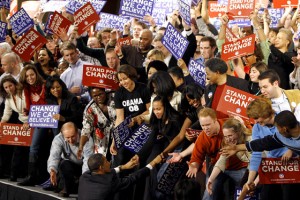
There is no doubt that if you’re reading this you already have serious problems with some of the aforementioned policies of the Obama White House (I’m making huge assumption about you, Dear TFW readers, but my sense is that we’re no single issue contingent.) But I’d also bet that for many of you, something happens when you hear Obama’s voice invoking the brilliant and incisive poet June Jordan: “We are the ones we have been waiting for.” If you hear that speech sampled in will.i.am’s “We Are the Ones,” my guess is that you’re damn close to tears. The truth is, so am I.
Hating to love (or some semblance of such mixed emotions) is endemic to the human condition, it seems. Stockholm Syndrome, trauma bond, codependency, battered women’s syndrome, and even cognitive dissonance are reactions to varying precipitating events, ranging from abduction to moderate but sustained parental emotional unavailability. But what each shares is that a traumatic or distressful experience yields an uncanny adaptive cognitive and emotional response. Put simply, we can and do learn to relate to and sometimes even celebrate people or experiences that are bad for us, that do us harm. People empathize with their kidnappers. Adult children defend their parents’ neglect. Spouses of addicts support the addiction that makes home life unwieldy. And so I wonder if our affection for Obama, in spite of some policies that are fundamentally at odds with human flourishing, maps onto these types of adaptive cognitive responses.
Consider my own ambivalent enrapture….
When covering the Democratic National Convention for The Feminist Wire I repeatedly experienced that mention of Osama bin Laden’s murder was met with resounding applause, and months later, I notice how Romney and Obama’s language regarding bin Laden is virtually indistinguishable from the President’s. I couldn’t disagree more with psychology professor Jonathan Haidt’s defense of the celebration that followed the week after Osama Bin Laden’s murder published in The New York Times , “You can’t just scale up your ideas about morality at the individual level and apply them to groups and nations. If you do, you’ll miss all that was good, healthy and even altruistic about last week’s celebrations.” I did not celebrate it then, and I cringe at the invocation of “our enemies” in so many Obama campaign ads now. These, I think, are not “my people.”
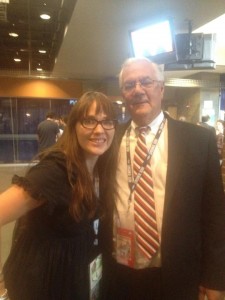 On the same night that I listened to a crowd, awaiting Obama’s formal nomination, celebrate the mention of “the hunt” of bin Laden (a glaring example of rhetorical dehumanization), I swooned when I saw Rep. Barney Frank in the Charlotte Convention Center. Earlier in the day, Frank had effortlessly slipped into gay vernacular in a DNC LGBT Caucus meeting. In a word, he dished, ending his truth-telling by calling out Log Cabin Republicans as “Uncle Toms.” It was a fierce moment of queer culture and resistance in the most mainstream of political spaces, and I reveled in it. Still enamored, I asked for a picture and delighted when he handed my cell phone to his husband, Jim Ready. Apparently at some level, Democrats are my people.
On the same night that I listened to a crowd, awaiting Obama’s formal nomination, celebrate the mention of “the hunt” of bin Laden (a glaring example of rhetorical dehumanization), I swooned when I saw Rep. Barney Frank in the Charlotte Convention Center. Earlier in the day, Frank had effortlessly slipped into gay vernacular in a DNC LGBT Caucus meeting. In a word, he dished, ending his truth-telling by calling out Log Cabin Republicans as “Uncle Toms.” It was a fierce moment of queer culture and resistance in the most mainstream of political spaces, and I reveled in it. Still enamored, I asked for a picture and delighted when he handed my cell phone to his husband, Jim Ready. Apparently at some level, Democrats are my people.
I notice that at the same time that American Dream imagery is continually invoked by the President, there is a glaring absence of conversation around policies that disproportionately impact particular Americans’ abilities to live that Dream. Specifically, not a single debate has made mention of policies that routinely preclude those with felony convictions from gainful employment. In fact, state law often precludes those with convictions from getting licensed in the very occupational fields prisons routinely offer job training in like cosmetology and barbering. With an incarceration rate that is unparalleled in the world, these kinds of barriers to employment and presumably access to some semblance of the American Dream go completely unmentioned. At the same time, Obama continually positions business as the solution to so many problems we face. Even as evidence routinely indicates that hyper-capitalism and the governmental policies that facilitate corporate growth including wealthfare and stagnating occupational safety regulations undermine the financial security and wellbeing of the majority of American workers, the Democrats increasingly deploy neoliberalism. It seems that some folks’ (American) dreams matter. But when I see mass swaths of people overlooked in favor of rhetoric that smugly celebrates those who have made “it,” I am certain that these are not my people.
And yet, I’ve also found myself canvassing for President Barack Obama this election cycle. Canvassing is the toilet bowl cleaning of political work. Unlike phone banking, you actually have to knock on people’s doors at really inopportune times and talk politics. Did I mention I live in North Carolina, a swing state, but a swing state predicted to swing Romney in this round? Canvassers are committed political volunteers, myself included. In a neighborhood populated largely by families with small children, I emphasized the unprecedented inclusion of the Obama White House—the passage of the Lily Ledbetter Act and an explicit commitment to marriage equality for LGBT citizens. I conveyed wholeheartedly that another Barack Obama Presidency would make the equality of America’s imaginings a greater reality. My take-home message was that regardless of their increased economic anxiety, a vote for Obama was a vote for a better life for their children, daughters who most certainly will be entering the workforce and sons some of who will grow into gay identities. I registered voters and solicited volunteers, all the while delivering a message: Democrats are your people.
I am voting for Barack Obama, but I am also clear that in many ways he, and by extension the Democratic Party, is not the one I’ve been waiting for.
Obama may be a token President, as some have suggested. His election is certainly not emblematic of a post-racial United States of America, though it is constantly invoked to demonstrate just that. But token aside, Obama’s Presidency does serve as a totem…in the Durkheimian sense. For Emile Durkheim, collective effervescence describes the shared emotional response that forges solidarity. Church, music festivals, frat houses, and gay bars can all be sites of collective effervescence. In each of these spaces, symbols, or more specifically, totems work as emblems of the community and thereby energize the group’s sense of connection. Communion is a totem. So are drag queens. And I think Obama is a totem, too, in that we respond to him not as a person but rather as a symbol. Let’s be real. Most of us don’t know Barack Obama as a man, and in fact, we probably don’t know anyone who does. Yet, so many of us have a deep emotional response to the symbolism of Obama. In fact, the collective effervescence his candidacy and subsequently his Presidency elicit may be unparalleled. And for good reasons. His election may not signal the end of racism, but it absolutely demonstrates a marked contrast to a history of systematic racial exclusion from US political participation. In contrast to the legacy of US Presidents born into the 1%, he seems relatable—student loans, a complicated family history, a refreshing ability to laugh at himself.
Collective effervescence is resonance. It feels good, but it can also be deeply problematic. Durkheim argued that as societies identify with a totem, there is a loss of individuality experienced by members of the group. In relation to President Obama, I worry that it is precisely the emotional response that he evokes that allows for a lack of critique and, I fear, a lack of conscience in relation to the problems of the Obama White House.
Just like the adaptive psychological responses in the face of trauma that allow us to empathize with destructive forces, the collective effervescence Obama ignites allows so many of us who truly crave a world that supports all human flourishing to ignore or selectively forget his Presidency’s role in policies unambiguously counter to “progress.” For those of us who care about the Pakistani humans impacted by drone attacks, the criminally convicted humans excised from civic participation, and poor humans whose lives are fleeced by the growth of corporate wealth, there are reasons to take issue with policies of the Obama White House. And in fact, taking issues is part of what we need to do, even as we may choose to vote for him because of our support of other policies of the very same Administration.
I will be voting for Obama. I hope that those whose doors I knocked on vote for him, too. But even as I’ll undoubtedly tear up just as I did in 2008 when I place my vote, I’ll also be remembering the aspects of Obama’s Presidency I do not support. And I hope that others do the same.
Those of us moved by Barack Obama’s original candidacy and election, who venerate many of the accomplishments of the Obama White House, can still take issue with the active role of the President in efforts fundamentally counter to any authentic notion of progress. In fact, we would do something in remembering the original message of Obama’s candidacy. Obama did not say, “I am the one you’ve been waiting for.” He straight up quoted June Jordan, emphasis on the “WE.”
We have critical perspectives and consciousness, reservations, and points of contention. Rather than succumbing to naïve sentiment or some uninformed allegiance to a candidate or a party, we might bring critical consciousness to bear in our support of the Democratic candidates we vote for. In holding the support alongside the critique of political efforts, we might do something towards enacting the very vision that made us fall in love with Obama in the first place.

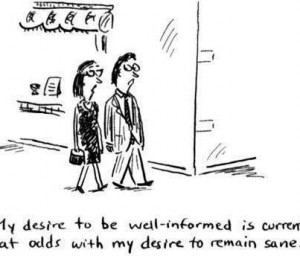
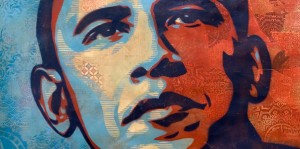
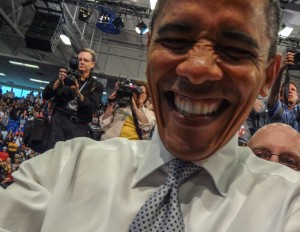
0 comments